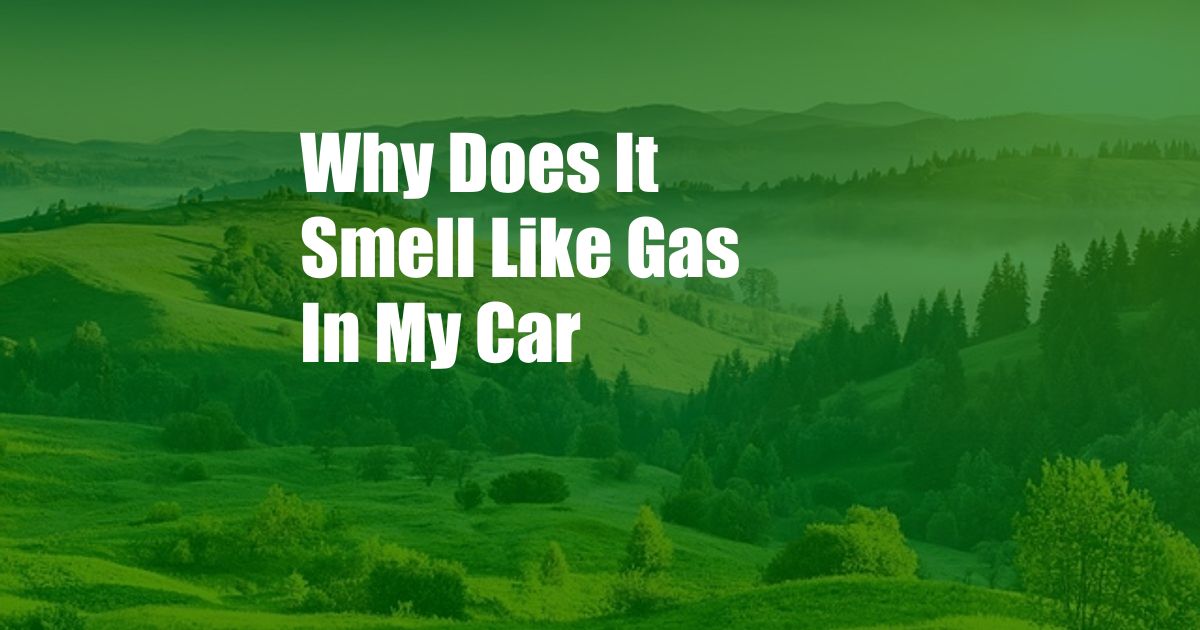
Why Does It Smell Like Gas in My Car?
Have you ever stepped into your car and been greeted by a strong odor of gasoline? While this smell can be alarming, it’s essential to remain calm and identify the source. A gas smell in your car can indicate a potential problem, and ignoring it could lead to more severe issues. In this article, we will explore the various reasons why your car might smell like gas and provide helpful tips to address the problem.
The scent of gas in your car can be attributed to several factors, ranging from minor leaks to more significant issues. Understanding the underlying cause is crucial for ensuring the safety and longevity of your vehicle. Let’s delve into the potential causes and solutions to help you resolve this issue effectively.
Gas Tank or Fuel Line Leak
One of the most common reasons for a gas smell in your car is a leak in the gas tank or fuel line. These leaks can occur due to corrosion, damage, or loose connections. Inspect the fuel system for any visible signs of leakage, such as wetness or dripping. If you notice a leak, it’s crucial to have it repaired immediately to prevent further fuel loss and potential fire hazards.
Faulty Fuel Injector
Fuel injectors are responsible for delivering fuel to the engine. A faulty injector can cause excess gas to be released, resulting in a gas smell. Malfunctioning injectors can also lead to poor engine performance, decreased fuel efficiency, and even engine damage. If you suspect a faulty fuel injector, it’s essential to seek professional assistance for diagnosis and repair.
Damaged Charcoal Canister
The charcoal canister is a component of the evaporative emissions control system. Its function is to trap and store fuel vapors, preventing them from being released into the atmosphere. A damaged charcoal canister can allow fuel vapors to escape, causing a gas smell. If you notice a strong gas odor when starting your car or refueling, it could be an indication of a compromised charcoal canister.
Overfilled Gas Tank
Overfilling your car’s gas tank can cause fuel to overflow and spill onto the ground or other components of the vehicle. This spilled gas can evaporate and create a strong odor. Additionally, overfilling the tank can put pressure on the fuel system, potentially leading to leaks and other problems. Avoid overfilling the gas tank to prevent these issues.
Tips and Expert Advice
If you detect a gas smell in your car, it’s crucial to address the issue promptly. Here are a few tips to help you resolve the problem:
- Park in a Ventilated Area: Move your car to a well-ventilated area away from sources of ignition to reduce the risk of fire or explosion.
- Avoid Starting the Engine: Do not attempt to start the engine if you smell gas. Starting the engine could ignite the fuel vapors, leading to a fire.
- Check for Leaks: Inspect the gas tank, fuel lines, and other components of the fuel system for any visible signs of leakage.
- Contact a Mechanic: If you are unable to identify the source of the gas smell or if you suspect a significant leak, it’s essential to contact a qualified mechanic for diagnosis and repair.
Frequently Asked Questions
- Q: Can a gas smell in my car be dangerous?
A: Yes, a gas smell in your car can be dangerous as it could indicate a fuel leak or other issue that could lead to a fire or explosion. It’s important to address the problem promptly. - Q: What should I do if I smell gas in my car?
A: If you smell gas in your car, park in a ventilated area, avoid starting the engine, and check for any visible signs of leakage. If you are unable to identify the source of the smell, contact a mechanic for assistance. - Q: How can I prevent a gas smell in my car?
A: To prevent a gas smell in your car, avoid overfilling the gas tank, ensure that the fuel cap is properly tightened, and regularly inspect the fuel system for any leaks or damage.
Conclusion
A gas smell in your car can be a cause for concern, but it’s important to remain calm and take immediate action to identify and resolve the issue. By understanding the potential causes and following the tips provided, you can ensure the safety and longevity of your vehicle. If you have any further questions or concerns, don’t hesitate to seek professional assistance from a qualified mechanic. Remember, addressing gas leaks and other fuel-related issues promptly is crucial for maintaining a safe and efficient driving experience.
Are you interested in learning more about car maintenance and safety? Explore our blog for additional articles and expert advice to keep your vehicle in optimal condition.